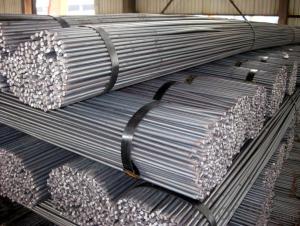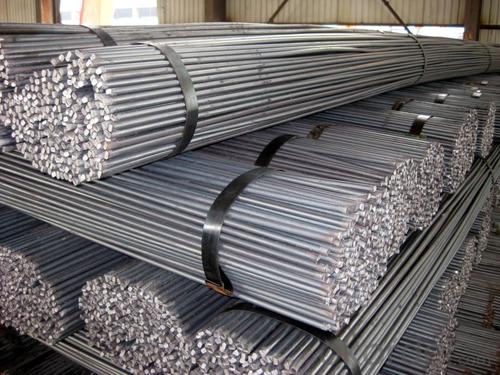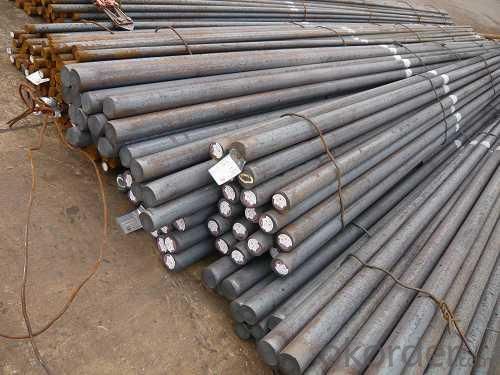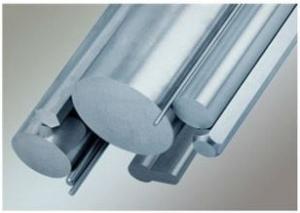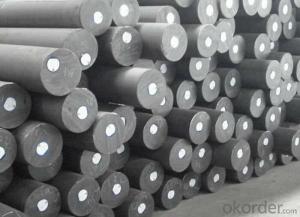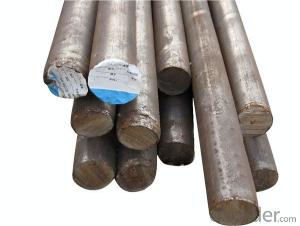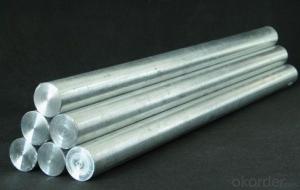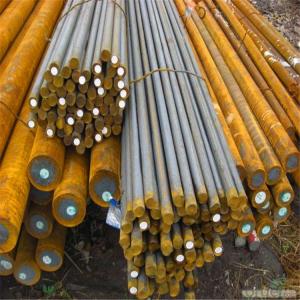Steel Round Bar Customize Hot Selling 310S 06Cr25Ni20 Stainless Cold Rolled
- Loading Port:
- Tianjin
- Payment Terms:
- TT or LC
- Min Order Qty:
- 28 m.t.
- Supply Capability:
- 40000 m.t./month
OKorder Service Pledge
OKorder Financial Service
You Might Also Like
Product Description:
OKorder is offering Steel Round Bar Customize Hot Selling 310S 06Cr25Ni20 Stainless Cold Rolled at great prices with worldwide shipping. Our supplier is a world-class manufacturer of steel, with our products utilized the world over. OKorder annually supplies products to European, North American and Asian markets. We provide quotations within 24 hours of receiving an inquiry and guarantee competitive prices.
Product Applications:
Steel Round Bar Customize Hot Selling 310S 06Cr25Ni20 Stainless Cold Rolled are ideal for structural applications and are widely used in the construction of buildings and bridges, and the manufacturing, petrochemical, and transportation industries.
Product Advantages:
OKorder's Steel Round Bar Customize Hot Selling 310S 06Cr25Ni20 Stainless Cold Rolled are durable, strong, and resist corrosion.
Main Product Features:
· Premium quality
· Prompt delivery & seaworthy packing (30 days after receiving deposit)
· Corrosion resistance
· Can be recycled and reused
· Mill test certification
· Professional Service
· Competitive pricing
Product Specifications:
1.Competitive price
2.JIS,AISI,ASTM,GB,DIN,EN
3.Best service
4.Quick deliver time
5.Prime quality
Article | Jiangsu Fengchuanyechun Stainless steel Co.,LTD |
specification | Thickness,Width,Length as your requirement |
Surface | 2B,2D,BA,8k mirror,Hairline,etc. |
Mode | Bars |
Thickness | Cold rolled : 0.3mm-6.0mm,Hot rolled:3mm-100mm |
Application | Stainless Steel Round Bar is mianly used in
1:Electric power,petroleum,boiler, high temperature resistant,
low temperature resistant,corrosion resistant
2:Tableware, cabinet, cutting tool, boiler, auto part
3:Medical instruments, building materials, food industry
4:Sea,chemical industry and Machine Manufacture
|
Packing | standard export packing |
Price terms | FOB/CFR/CIF |
Payment terms | 1.30%T/T in advance , the balance against the B/L copy |
2.30% T/T in advance , the balance L/C | |
3.100%L/C at sight | |
Delivery Time | 1.Within 5 days for regular specification after getting the deposit |
2.Within 5 days for regular specification after getting the original L/C |
FAQ:
Q1: Why buy Materials & Equipment from OKorder.com?
A1: All products offered byOKorder.com are carefully selected from China's most reliable manufacturing enterprises. Through its ISO certifications, OKorder.com adheres to the highest standards and a commitment to supply chain safety and customer satisfaction.
Q2: How do we guarantee the quality of our products?
A2: We have established an advanced quality management system which conducts strict quality tests at every step, from raw materials to the final product. At the same time, we provide extensive follow-up service assurances as required.
Q3: How soon can we receive the product after purchase?
A3: Within three days of placing an order, we will begin production. The specific shipping date is dependent upon international and government factors, but is typically 7 to 10 workdays.
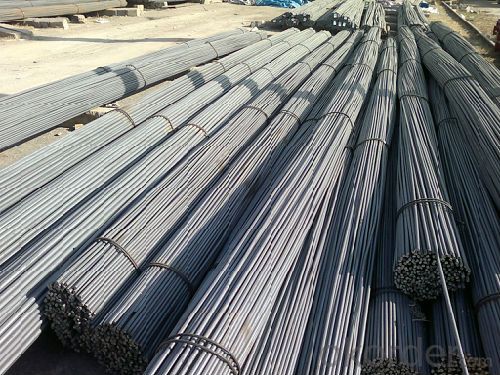
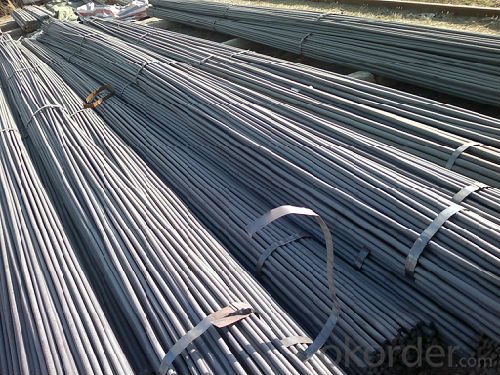
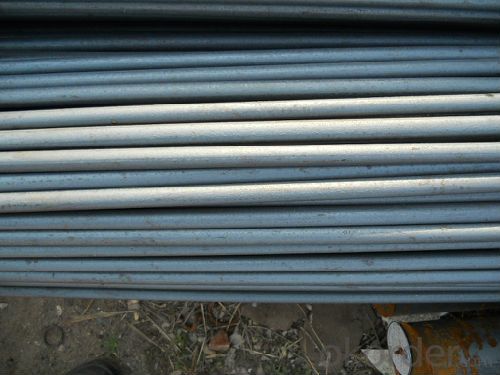
- Q: What is the difference between a hot rolled and a turned steel round bar?
- The manufacturing process and resulting characteristics distinguish a hot rolled steel round bar from a turned steel round bar. To produce a hot rolled steel round bar, steel billets or ingots are heated to a high temperature and then rolled into the desired shape. This process facilitates easy forming and shaping, resulting in a bar with a rough surface and a slightly rounded or irregular shape. Hot rolling also enhances the overall strength and toughness of the steel, making it suitable for various applications. In contrast, a turned steel round bar is machined on a lathe from a hot rolled or cold drawn bar. This machining process involves removing material from the bar's surface using cutting tools, resulting in a smooth and precise finish. Turning allows for superior dimensional accuracy and control over the final shape and size of the bar. Regarding surface finish and dimensional accuracy, a turned steel round bar generally provides a higher level of precision compared to a hot rolled bar. The turned bar possesses a smoother surface with fewer imperfections, making it ideal for applications where appearance and aesthetics are important. Furthermore, the turned bar typically adheres to tighter tolerances, ensuring consistent dimensions throughout its length. The choice between a hot rolled and a turned steel round bar depends on the specific requirements of the application. Hot rolled bars are commonly employed in construction, manufacturing, and general engineering applications where strength and toughness play crucial roles. On the other hand, turned bars are frequently utilized in industries such as automotive, aerospace, and precision machining, where a high level of surface finish and dimensional accuracy is necessary. In conclusion, the distinction between a hot rolled and a turned steel round bar can be attributed to the manufacturing process and resulting characteristics. Hot rolled bars offer strength and toughness, while turned bars provide a smoother surface finish and greater dimensional accuracy. The choice ultimately hinges on the specific needs of the application.
- Q: Can steel round bars be painted?
- Yes, steel round bars can be painted.
- Q: What are the cost considerations for steel round bars?
- The cost of steel round bars can vary depending on several factors. Firstly, the cost can be greatly influenced by the type and grade of steel used in production. Different types of steel, such as carbon steel, alloy steel, or stainless steel, have varying costs due to differences in their composition and properties. Higher grade steel, which offers superior strength and durability, tends to be more expensive compared to lower grade options. Secondly, the cost is affected by the size and dimensions of the round bars. Larger diameter and length of the bars require more raw material and additional processing, resulting in higher costs. Moreover, specialized shapes or custom sizes may necessitate extra manufacturing steps or tooling, which can increase the overall price. The quantity or volume of round bars ordered can also impact the cost. Bulk orders typically benefit from economies of scale, leading to reduced unit costs. Additionally, longer-term contracts or partnerships with suppliers can result in better pricing agreements. It is important to consider transportation and logistics expenses as well. The cost of shipping steel round bars can vary based on factors such as distance, mode of transportation, and handling requirements. International shipping, for example, may involve additional customs duties and taxes. Lastly, market conditions and fluctuations in the steel industry can have an impact on the cost of round bars. Factors like supply and demand, raw material costs, and currency exchange rates can all influence the final price. It is crucial to stay updated with market trends and work closely with suppliers to negotiate favorable pricing. To ensure that the cost of steel round bars aligns with your budget and meets your specific requirements, it is essential to conduct thorough research, compare quotes from multiple suppliers, and evaluate the quality-to-price ratio before making a decision.
- Q: How do steel round bars perform in high-pressure applications?
- Steel round bars are known for their exceptional strength and durability, making them highly suitable for high-pressure applications. When subjected to high-pressure conditions, steel round bars exhibit excellent resistance to deformation and maintain their structural integrity. This enables them to withstand the intense forces and maintain their shape, ensuring the safety and reliability of the application. Steel round bars are often used in high-pressure applications such as hydraulic systems, oil and gas pipelines, aerospace components, and high-pressure vessels. Their robust nature allows them to handle the extreme pressures experienced in these applications without failure. The high tensile strength of steel ensures that the bars do not buckle or collapse under pressure, providing the necessary support and stability required for such demanding environments. Additionally, steel round bars possess excellent corrosion resistance properties, which is crucial in high-pressure applications. They can withstand exposure to harsh chemicals, moisture, and other corrosive elements, preventing rusting or degradation over time. This corrosion resistance ensures the longevity and reliability of the steel round bars in high-pressure environments, reducing the risk of premature failure. Furthermore, steel round bars offer versatility in terms of grades and alloys, allowing for customization to meet specific high-pressure requirements. Different grades of steel, such as carbon steel, alloy steel, or stainless steel, can be utilized based on the application's demands. This versatility ensures that the steel round bars can be tailored to provide optimal performance and meet the specific pressure and temperature requirements of the application. In conclusion, steel round bars excel in high-pressure applications due to their exceptional strength, durability, and corrosion resistance properties. Their ability to withstand intense forces and maintain their shape makes them a reliable choice for various industries, including hydraulic systems, oil and gas pipelines, aerospace, and high-pressure vessels. By utilizing steel round bars, companies can ensure the safety, reliability, and longevity of their high-pressure applications.
- Q: What are the weight calculations for steel round bars?
- The weight calculations for steel round bars depend on the diameter and length of the bar. The formula used to calculate the weight is weight = volume × density, where volume = π × (diameter/2)² × length and density = 7.85 g/cm³.
- Q: Can steel round bars be hardened or tempered?
- Yes, steel round bars can be hardened or tempered.
- Q: What are the different types of heat treatment for steel round bars?
- Steel round bars commonly undergo various heat treatment methods to enhance their mechanical properties and overall performance. These methods include annealing, normalizing, quenching, tempering, and case hardening. 1. Annealing: Steel round bars are heated to a specific temperature and gradually cooled to room temperature. This process reduces internal stresses, improves machinability, and enhances ductility. 2. Normalizing: The steel round bars are heated above the critical range and cooled in still air. Normalizing refines the grain structure and improves mechanical properties like strength and toughness. 3. Quenching: Steel round bars are heated to a high temperature and rapidly cooled by immersing them in a quenching medium such as water, oil, or polymer. This results in a hardened microstructure, increasing hardness and wear resistance. 4. Tempering: After quenching, the steel round bars undergo tempering. The quenched steel is reheated to a specific temperature and cooled in still air. Tempering reduces brittleness caused by quenching, increases toughness, and relieves residual stresses. 5. Case hardening: This process increases the hardness and wear resistance of the outer surface of steel round bars while maintaining a tough and ductile core. Case hardening involves heating the steel in a carbon-rich atmosphere or applying a carbon-rich substance, followed by quenching and tempering. Each heat treatment method has its advantages and is chosen based on the desired properties and applications of the steel round bars. It is crucial to select the appropriate heat treatment process to achieve the desired mechanical properties and performance.
- Q: Are steel round bars suitable for use in the mining industry?
- The mining industry finds steel round bars to be suitable for use. These bars are renowned for their strength and durability, making them an ideal choice for heavy-duty equipment and machinery in mining. They can be utilized in various ways, such as shafts, support beams, and structural components in underground mines, open-pit mines, and processing plants. The steel round bars have the capability to withstand high loads and pressures, enabling them to thrive in harsh mining environments. They possess excellent tensile strength and can endure extreme temperatures, resulting in resistance to wear, abrasion, and impact. This is especially valuable in mining operations where equipment is subjected to heavy loads, vibrations, and constant movement. Furthermore, the steel round bars are easily weldable, fabricated, and machined to meet specific requirements, making them versatile and adaptable for a wide range of mining applications. They can be customized in terms of size, length, and shape, ensuring a perfect fit for various mining equipment and structures. Beyond their strength and versatility, steel round bars also offer cost-effectiveness and long-term value. They have a long lifespan, require minimal maintenance, and can withstand the harsh conditions typically encountered in mining operations, reducing the need for frequent replacements or repairs. Overall, steel round bars are a reliable and suitable choice for the mining industry due to their strength, durability, versatility, and cost-effectiveness. They provide the necessary support and structural integrity required for mining operations, ensuring the safety and efficiency of the industry.
- Q: What is the composition of steel round bars?
- Steel round bars are typically composed of iron and carbon, with small amounts of other elements such as manganese, silicon, and sulfur. The exact composition can vary depending on the specific grade and intended use of the steel.
- Q: What is the maximum titanium content allowed for steel round bars?
- The maximum titanium content allowed for steel round bars typically depends on the specific steel grade and composition. However, as a general guideline, the maximum titanium content in steel round bars is usually around 0.05-0.06%.
Send your message to us
Steel Round Bar Customize Hot Selling 310S 06Cr25Ni20 Stainless Cold Rolled
- Loading Port:
- Tianjin
- Payment Terms:
- TT or LC
- Min Order Qty:
- 28 m.t.
- Supply Capability:
- 40000 m.t./month
OKorder Service Pledge
OKorder Financial Service
Similar products
Hot products
Hot Searches
Related keywords
